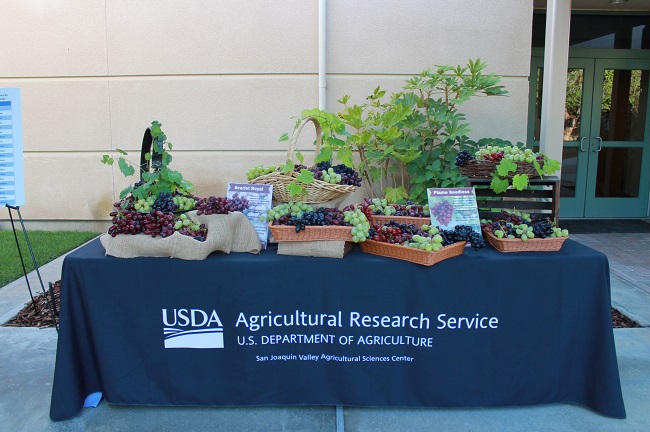| 100th Anniversary of Grapevine Breeding Research Program |

|

USDA Commemorates 100 Years of Contributions to the Grape Industry
For media inquiries contact: Nirav Shah, (331) 313-7665
PARLIER, Calif., September 12, 2023 — The U.S. Department of Agriculture’s Agricultural Research Service (ARS) San Joaquin Valley Agricultural Sciences Center (SJVASC) today celebrated 100 years of cooperative research with the grape industry that has positively impacted the way the world grows, cultivates and consumes grapes.
This historic grapevine breeding research program develops and introduces new, high-quality, disease-resistant table grapes and raisins cultivars. The first table grape cultivar was developed in 1923 in Fresno, California, at the USDA Experiment Vineyard, part of the USDA Bureau of Plant Industry. In 1972, the program became part of ARS, the chief in-house research agency of the USDA.
Since then, ARS scientists have developed over half of the top 10-15 seedless grape varieties. The red seedless ‘Flame’ cultivar grape was grown by ARS scientists in 1973. The green seedless ‘Autum King’ grape was developed and released in 2006, and in 1983, ARS scientists invented seedless black grapes.
“The phenomenal research conducted by our scientists over the past 100 years created a billion-dollar industry and has defined how the world grows and consumes table grapes,” said ARS Administrator Dr. Simon Liu. “As we move into the next 100 years, our collaboration with the San Joaquin Valley Agricultural Sciences Center will continue to deliver innovative research that will produce high-quality, nutritious fruits for future generations.”
Red seedless grapes were unknown to U.S. consumers before ARS released the Flame variety. The release of another ARS variety, Crimson red seedless, in 1989 further increased this table grape’s popularity. Now grown extensively by domestic and foreign producers, these two varieties comprise a significant part of today’s consumer market for table grapes.
“The farming community in California produces 99 percent of the table grapes grown in the United States, and scientists working at SJVASC have led this effort,” said ARS Pacific West Area Director Dr. Tara McHugh. “This day recognizes a century of innovative research that has increased crop productivity and improved the quality and marketability of the table grapes we eat today.”
Full-Length Video: https://shared-assets.adobe.com/link/e557edf8-8c20-44aa-6799-e596a2775c63
